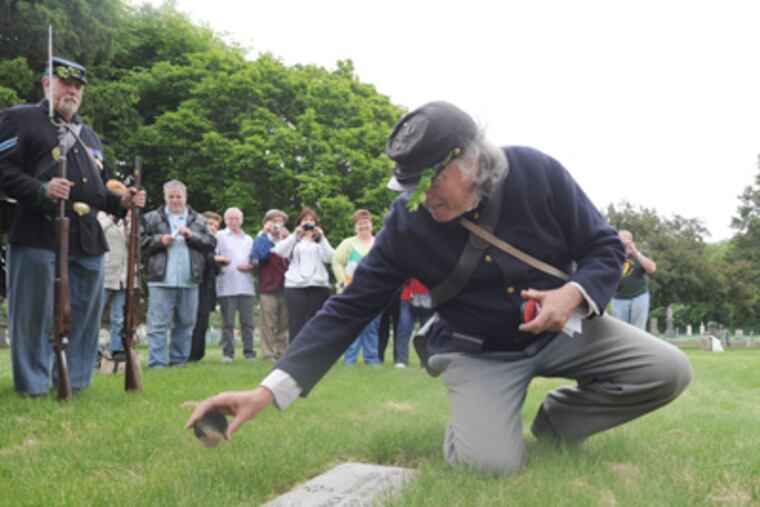Civil War reenactors remember the Philadelphia dead
Under a sunless morning sky Saturday, young Timmy Kelly sang the haunting Irish patriotic ballad "Minstrel Boy" while reenactors from the 69th Pennsylvania Irish regiment stood at five graves where headstones had been placed on graves of Civil War soldiers at New Cathedral Cemetery in North Philadelphia.

Under a sunless morning sky Saturday, young Timmy Kelly sang the haunting Irish patriotic ballad "Minstrel Boy" while reenactors from the 69th Pennsylvania Irish regiment stood at five graves where headstones had been placed on graves of Civil War soldiers at New Cathedral Cemetery in North Philadelphia.
While parades, battle reenactments, and speeches will be common to mark the 150th anniversary of the Civil War, the mission of the 69th Pennsylvania Irish regiment is different:
They locate the burial spots of Civil War solders whose families could not afford gravestones. They sift through Philadelphia death records, and look up cemetery plot maps. When they find a soldier, they file the required paperwork to get a head stone for the unmarked grave.
"We have located 350 of our soldiers around the country. Of those, we have put stones on 66," said Don Ernsberger, former Council Rock High School history teacher and author of five Civil War books including Paddy Owen's Regulars about the 69th Pennsylvania "Irish Volunteers" from Philadelphia.
"Every time we think we've found everybody, we find a few more," said Ernsberger, also a reenactor who portrays Pvt. John Harvey. "Of the 1,400 total in the regiment during the war, probably about half have headstones."
Joining the 15 reenactors Saturday was a crowd of 50 onlookers and descendants of the five Union army soldiers honored with prayers, Holy Water, Irish and American flags, and three volleys of rifle shots over their graves.
The five, all born in Ireland and ages 22 to 38 when they marched in battles from Glendale to Antietam, Gettysburg to Petersburg, were: Capt. Thomas Woods, Sgt. Patrick McAnally, Pvt. Philip O'Reilly, Sgt. Robert Stinson, and Pvt. Rodger Laughling.
"I started this research in 1973, and I didn't know until about 2 ½ years ago that I was a descendant," said Cecilia Kinney, of Bensalem, a great-great- granddaughter of Patrick McAnally.
Kinney scoured census records, civil war and military records. She and her cousin, Joe Kinney of Warrington, searched records of St. Michael's Catholic Church at Second and Jefferson Streets, where Patrick McAnally's children were baptized.
"I'm thrilled to be here. It's very emotional," said Marge Stinson Foley, of Closter N.J. "I have always known my grandfather, Robert Stinson, fought in the Civil War. When I got my first car, I took my parents to the Gettysburg battlefield. The names of my grandfather and his brothers are on the Pennsylvania monument there. I didn't know it was possible to do something like this, to honor my grandfather."
Another descendant, the singer Kelly, who performs the "National Anthem" at Philadelphia Eagles and Phillies games, is Sgt. Stinson's great-great-grandson.
"This event pays tribute to our ancestors in such a great way," said Kelly, a junior at Lower Moreland High School. "I am honored that I was singing here, and I am so proud that he was my great great grandfather."
Ernsberger, who wrote a history of the 69th Pennsylvania "Irish Volunteers," was master-of-ceremonies. He read a brief biography about each soldier. The Rev. Michael Heim blessed and sprinkled Holy water. Ernsberger placed soil from Ireland around the graves.
"We actually have 11 soldiers buried in that cemetery. But the problem we have is that you must have a living descendant sign the legal papers to put a gravestone on," Ernsberger said. "Some of these men had no children. They were never married, so there is no living descendant."
"We have men all over this area, where we know where their bodies are, but we cannot put a gravestone down because we cannot produce the affidavit that we have a living descendant. The U.S. Veterans Administration provides the stone, but requires that a descendant authenticate it and do an affidavit. We have locations where we'd love to put gravestones down, but we have no idea who the descendants are, so therefore we can't take care of the legal problem with it."